-
Tilda Swinton, Only Lovers Left Alive
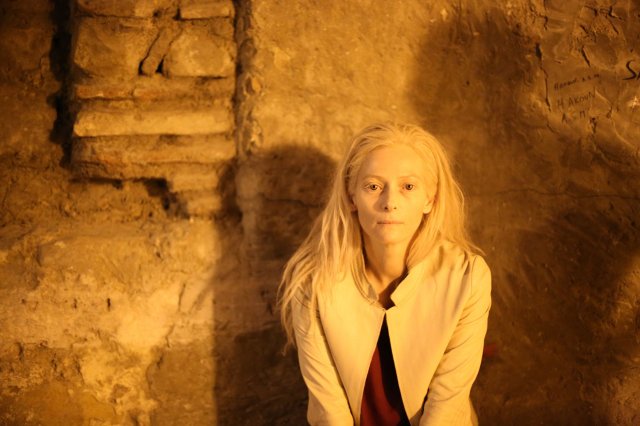
Sandro Kopp—Sony Pictures Classics At 54, the Queen of the Indies hasn’t let an Oscar (Supporting Actress for Michael Clayton) impede her taste for appearing in non-Hollywood films of the oddest, most daring stripe. In 2014 she graced four impressive movies: as Ralph Fiennes’ octogenarian lover in The Grand Budapest Hotel, as a deranged shrink in Terry Gilliam’s The Zero Theorem, as a futurist, bucktoothed reactionary in Bong Joon-ho’s Snowpiercer and, triumphantly, as a 2000-year-old hottie in Jim Jarmusch’s vampire romance Only Lovers Left Alive. She is Eve to Tom Hiddleston’s Adam; these creatures of antediluvian vintage share an enduring passion, though she dwells in Tangier and he in Detroit. Tall, slim aristocrats with matching cello voices and feral manes (makeup designer Gerd Zeiss gave them yak and goat hair), they embody an older, graver, more graceful species, dancing to a score that turns dirges into the sublimest ballads. The perfect icon for timeless beauty, Swinton is the better half of a couple whose joy, not pain, is to be together forever.
-
Jenny Slate, Obvious Child
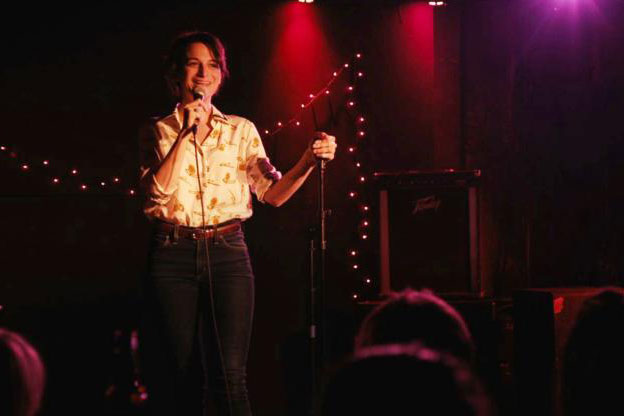
A24 Donna Stern is a standup comic in the confessional mode, which is rough on boyfriends who don’t want their intimacies turned into public shtick. When a one-night stand with nice-guy Max (Jake Lacy) results in pregnancy, Donna visits Planned Parenthood for a procedure that the guys in Knocked Up were afraid even to name; they said it “rhymes with shmuh-shmortion.” Yes, Obvious Child is the rom-com about a woman who wants an abortion, and writer-director Gillian Robespierre deftly navigates the political, ethical and personal eddies that have led Donna to her decision. Robespierre’s smartest call was in entrusting Donna to Slate, a TV-comedy veteran (SNL, Parks and Recreation, Kroll Show) in her first leading movie role. The actress has the growly voice of a child trying to talk like an adult, and a lovely, perky, extraordinarily malleable face that can go flirtatious, frowny or beatific within seconds. As likely to well up in tears as make somebody laugh, she’s part Sarah Silverman, part Maria Callas. The performance could be either a fluke or a star-is-born launch, but either way, Slate is great.
-
Essie Davis, The Babadook
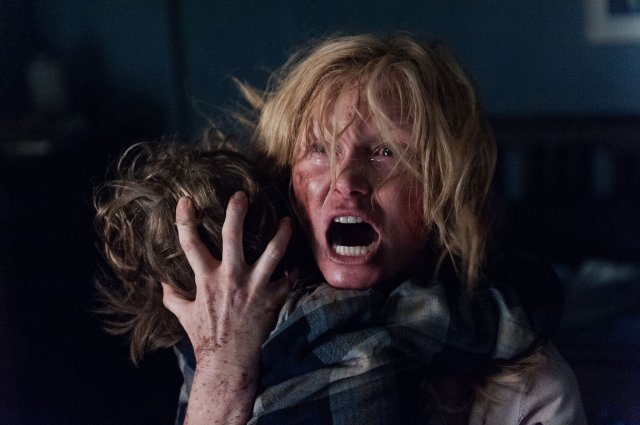
Causeway Films “If it’s in a word or it’s in a look, you can’t get rid of the Babadook.” Jennifer Kent’s artfully chilling Australian horror movie, named Best First Feature by the New York Film Critics Circle, uses a mysterious children’s book to manifest the tensions in the home of the widowed Amelia (Davis) and her troubled young son Samuel (Noah Wiseman). Seven years before, Amelia’s husband died as he was driving her to the hospital to give birth to Samuel. But the Babadook, a Nosferatu creature in coroner’s garb and a top hat, may drive her over the precarious edge she teeters on. Slithering into her bedroom and her roiled dreams, it could be an actual monster or the spawn of Amelia’s or Samuel’s waking nightmares. A twist on Roman Polanski’s Repulsion, but with a child’s life at stake, The Babadook is a sizzling showcase for the 34-year-old Davis. This lovely blond is at first Samuel’s sweet supporter, until the burdens of raising a difficult child in a haunted house turn her haggard, with a chance of homicidal. Davis makes Amelia’s trip plausible and pitiful at every stop on the road to Hell.
-
David Oyelowo, Selma
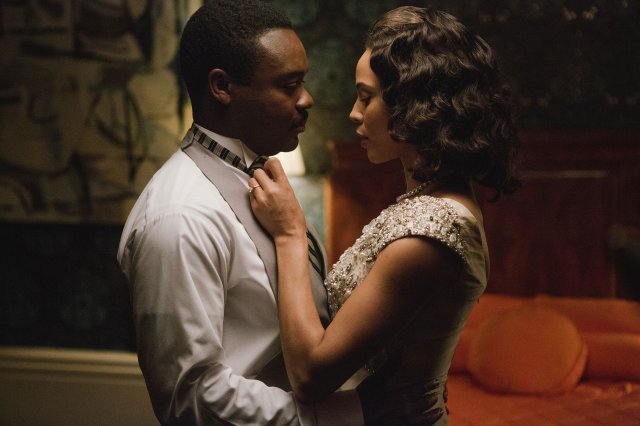
Paramount Pictures Left to right: David Oyelowo plays Martin Luther King, Jr. and Carmen Ejogo plays Coretta Scott King For years he had a dream: to play Martin Luther King Jr. This British actor got the role of the civil rights hero when Selma was to be directed by Lee Daniels, who had cast him as the rebellious son in The Butler. When Daniels left the project, Oyelowo lobbied for the job to go to Ava duVerney, for whom he had starred in the intimate indie Middle of Nowhere. Both the actor and the filmmaker proved equal to this mural-size retelling of King’s mission to pass the Voting Rights Act in the wake of the bombing deaths of four girls in a Selma, Ala., church. In a warm, cagey performance, Oyelowo goes easy on the eloquent oratory to focus on King’s skills of political persuasion: everyone from Lyndon Johnson (Tom Wilkinson) to Selma’s most devout parishioner (Oprah Winfrey) feels the power of his argument, the singe of his soul. Until now, King had never been the focus of a major Hollywood drama. Now the world can share his cogent, potent personality — and the fulfillment of Oyelowo’s dream.
-
Jack O’Connell, Unbroken
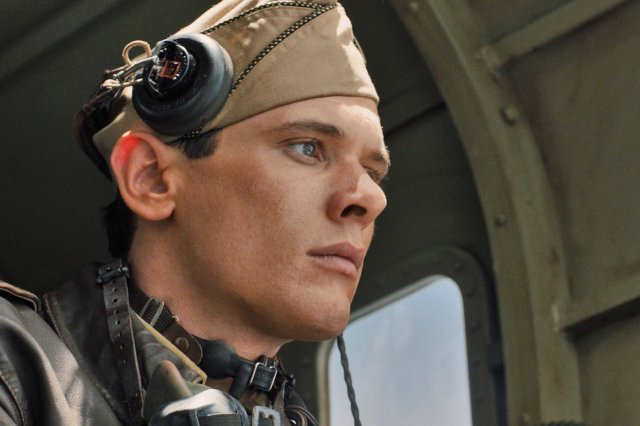
Universal A nonfamous English actor takes the lead role of a true American hero in a woman director’s large-scale period film. As David Oyelowo anchored Selma, so does O’Connell incarnate the grit of endurance in Angelina Jolie’s imposing, important bio-pic of Louis Zamperini. This son of Italian immigrants, who died in July at 97, had already lived three lives before he was 30. He ran the 5,000-meter race at the 1936 Berlin Olympics (Hitler dropped by to congratulate him); survived the crash of his B-24 as a bombardier in the Pacific War and spent 47 days near starvation on a life raft; was captured by the Japanese, sent to a prison camp and for two years suffered the personal torture of the sadist in charge. Such a triptych of physical and emotional perseverance — in movie terms, Chariots of Fire plus Life of Pi plus River Kwai — demands an actor who can portray not just the horror of Louis’s plight but his supernal will to outlive it. “If you can take it,” Louis is told early in the movie, “you can make it.” Taking the Zamperini role and making it come alive, even at the point of death, O’Connell is the resilient spirit of Unbroken.
-
Eva Green, 300: Rise of an Empire and Sin City: A Dame to Kill For
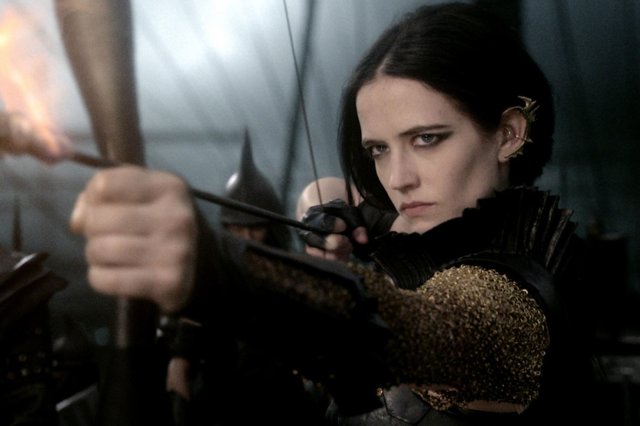
Warner Bros. Every once in a while, the fan of R-rated action movies has to be reminded that they used to get the Restricted seal for sex as well as violence. Today, when filmmakers want to spice their gore cocktails, they call on Green, the Franco-Swedish actress who has been a sensation since her debut in Bernardo Bertolucci’s The Dreamers. Two fair-to-good sequels this year gave Green a long runway to strut her powerful stuff. As Artemisia, the kohl-eyed leather goddess who battles and seduces a Spartan navy in Rise of an Empire, Green channels cultural history’s most implacable divas, from Medea to Cruella de Vil. In Robert Rodriguez’s followup to Sin City, she’s Ava Lord, than whom no femme is more fatale. Green’s imposing solemnity allows her to play these camp vamps as if they were tragic heroines — ideal for meta-pulp roles that mix hubris and the hots. She also showed up in White Bird in a Blizzard, hilariously miscast as Shailene Woodley’s mom. Green, who regularly wows viewers with her smolder, can’t persuade them that she’s a frump suffering from daughter envy. Well, we all gotta work.
-
Marion Cotillard, The Immigrant and Two Days, One Night
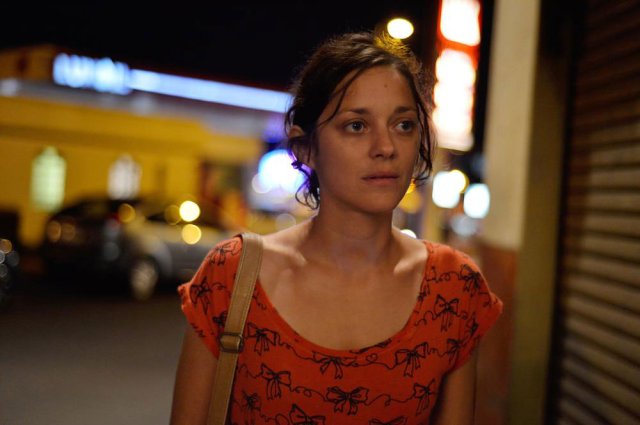
Sundance Selects One of only two performers to earn a Best Actress Oscar in a foreign-language film (she for La vie en rose in 2008, Sophia Loren for Two Women in 1962), Cotillard has suavely shuttled between American and French projects. In James Gray’s The Immigrant, set in the tenements, homes ill-repute houses of 1921 New York City, she plays Ewa, a young Polish woman who gets derailed on Ellis Island and is forced into a life of degradation by a predatory showbiz weasel (Joaquin Phoenix). In Two Days, One Night, from the Belgian brothers Jean-Pierre and Luc Dardenne, Cotillard is Sandra, a factory drudge who learns she has been laid off but might be reinstated if she can convince each of her fellow employees to forfeit a €1000 bonus. In the first film she is a huckster’s victim; in the second, a substandard worker — ostensibly curious casting for an actress with such a proud, regal bearing. Yet she is instantly convincing in both parts, with the audience on her side even as her characters fight to save their lives and livelihoods. For both movies, Cotillard was named Best Actress by the New York Film Critics Circle.
-
Chadwick Boseman, Get On Up
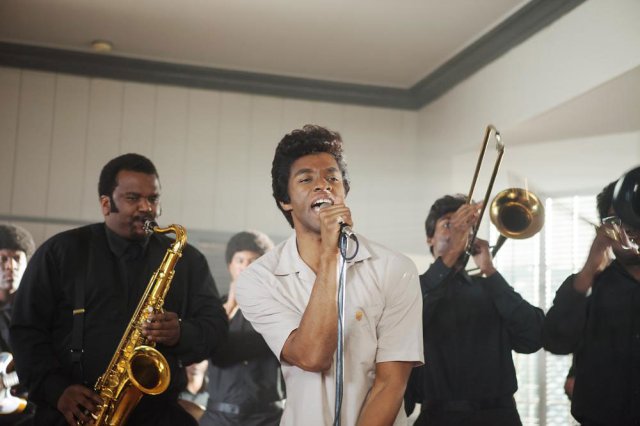
Universal Like Martin Luther King, James Brown had to wait nearly a half-century past his epochal prime for a sturdy bio-pic. Maybe the Godfather of Soul was just too raw, too black, to convince Hollywood bosses to put his amazing life on film. With a scalding tenor that could melt vinyl, Brown was an R&B star for a decade before his Top-40 breakthrough in 1965 with “Papa’s Got a Brand New Bag.” On the evidence of the film directed by Tate Taylor (The Help), this dynamite showman could also be a pain to work for and a terror to share a bed with. Incarnating Brown from age 16 to 60, Boseman, who played Jackie Robinson in 42, gives full value to a singer with so many sides, he could be his own Greatest Hits album. Mastering Brown’s on-stage dance moves, Boseman is a wondrous dervish — fully possessed in both sense of the word. Even in repose, he radiates his subject’s drive, sex, menace and spirit. Incarnating Brown in all his ornery uniqueness, Boseman deserves an Oscar, a Pulitzer, a Nobel and instant election to the Rock ’n Roll Hall of Fame.
-
Julianne Moore, Still Alice
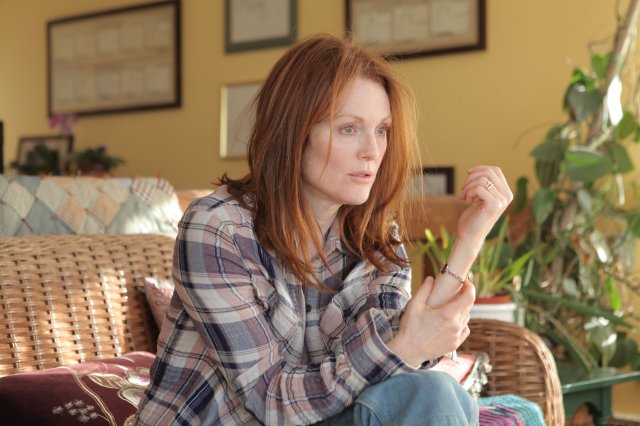
Sony Pictures Classics What other star is so reliably fearless and pitch-perfect? Even in extreme roles, like the aging actress fighting for one last great part in David Cronenberg’s corrosive movie satire Maps to the Stars (to be released in the U.S. in February), she never showboats or grandstands. In a busy year when she took a flight with Liam Neeson in Non-Stop and played the rebel President in The Hunger Games: Mockingjay Part 1, Moore found a role of her lifetime as Alice Howland, the linguistics professor in Richard Glatzer and Wash Westmoreland’s excellent adaptation of the Lisa Genova novel Still Alice. A sister of sorts to Moore’s character in the 1995 Safe, worn down by environmental toxins, Alice is stricken at 50 with early-onset Alzheimer’s. Trained to analyze words, she now cannot locate them — or the bathroom, when she needs to go. Moore is quietly magnificent, locating each poignant nuance as Alice tries valiantly if vainly to hold on to her memory, her bearings, her loving but increasingly distant family, her old cunning, her self. We hate to use the O word but, come Academy Award time, Still Alice may well bring this four-time Oscar nominee the honor she has so long and richly deserved.
-
Benedict Cumberbatch, The Imitation Game
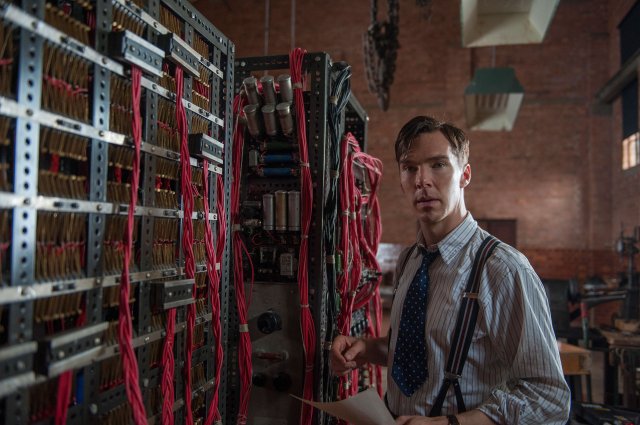
Jack English—The Weinstein Company If you need an actor to lend the sting of Olympian intelligence to men above and apart — Sherlock Holmes in the BBC series, Julian Assange in The Fifth Estate, Stephen Hawking in a 2004 TV movie — you go to Cumberbatch. Fantasy filmmakers cast him as Khan in Star Trek Under Darkness and the voice of Smaug in the Hobbit movies. But no character is more brilliant and intimidating, or crippled, than Cumberbatch’s Alan Turing in Morten Tyldum’s superb bio-pic. The gay genius who fathered the modern computer, known as the Turing machine, annoys his colleagues assembled to crack the Germans’ World War II Enigma code and insists on making the crucial decisions because, he says, “No one else can.” Cumberbatch brings an almost erotic power to a man who makes his magic in his head. The “action” here is Turing tinkering with his machine. Or simply thinking — which, as Cumberbatch portrays it, is adventure of the highest order. In The Theory of Everything, Eddie Redmayne excellently played another Cambridge math whiz, Hawking. But Cumberbatch had to be the one and only Turing. Why? Because no one else could.